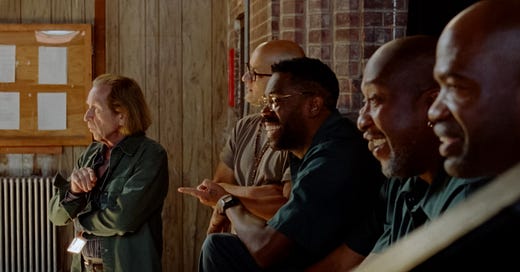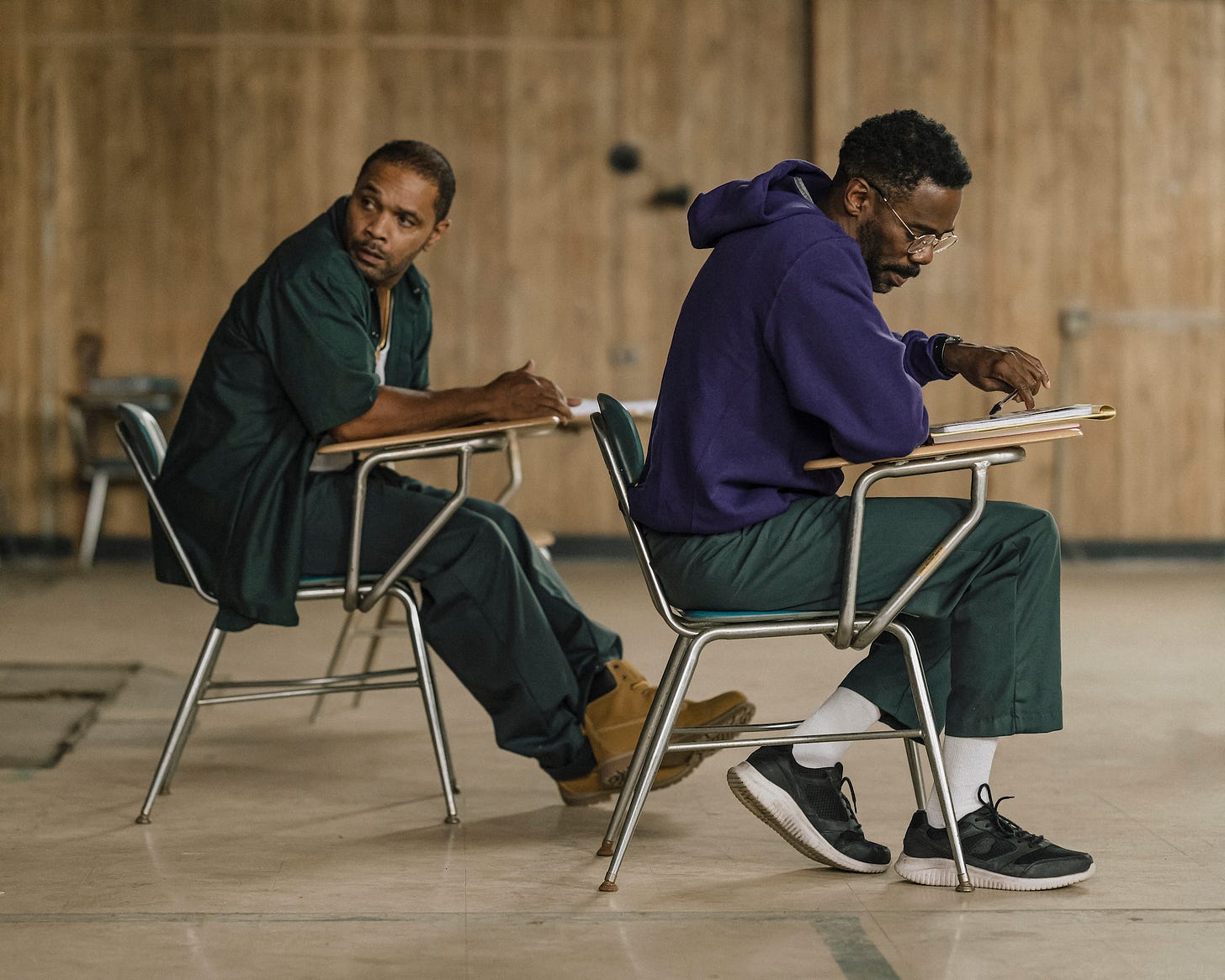No Stony Tower or Walls of Beaten Brass Can Keep These Good Men Down
Sing Sing is a beautiful ode to the redemptive power of the arts
I haven’t stopped thinking about Greg Kwedar and Clint Bentley’s Sing Sing since I saw it for the first time almost three weeks ago, nor of Colman Domingo’s eyes and how they express joy and anger and frustration and hope, sometimes all at once. It’s that rare film that feels like a true collaborative effort, where you feel each individual’s commitment, in front of and behind the camera, to tell a story that stays true to the experience lived by every single actor involved. Bentley may have based the script on John H. Richardson article for Esquire The Sing Sing Follies and on Breakin’ the Mummy’s Code, the original musical Brent Buell wrote with the members of the Rehabilitation Through the Arts (RTA) program at New York’s maximum-security Sing Sing Correctional Facility; but what we see in the screen feels of the moment and not exactly a reenactment. It’s the closest an American independent film has come to emulating Ken Loach’s collective filmmaking approach and his empathy.
That level of authenticity is due to the fact that Kwedar, Bentley and Domingo decided to cast RTA alumni, most of whom took part in the original production of Breakin’ the Mummy’s Code. This may be their first time in front of the camera but each of these actors not only bring to their performances their own lived experiences but also the techniques learned in the program to convey them convincingly and earnestly. Their stories serve as a conduit to the main one: that of John Whitfield, a.k.a. Divine G. (Domingo), an actual alumni of the program who wrote a good portion of the plays performed by the inmates and who, with new evidence in hand, is waiting for his next parole hearing after having been sentenced for a crime he did not commit.
The film opens with the final moments of an RTA production of Shakespeare’s A Midsummer’s Night Dream with Divine G. reciting the last verses of the play (a scene that made me wish for a production of Shakespeare’s The Two Gentlemen of Verona starring Domingo and Denzel Washington). The question for the group, as they take off their costumes and celebrate, is, as always, what’s next? Divine G. has been writing a rather long satirical play that may or may not be ready for production. He also recruits a new member for the project: the volatile Divine Eye (an electric Clarence Maclin, playing a younger version of himself) who also knows a thing or two about Shakespeare, especially when he is asked to recite a complete monologue from KIng Lear after shaking down a fellow inmate. It is Divine Eye who suggests that the group should try their hand at comedy since, after all, life is too serious and depressing already inside. The idea is immediately embraced by the other members of the ensemble and begin pitching extravagant ideas about what the play should be about and what type of characters it should include, from pharaohs and pirates to Freddy Krueger. Brent Bruell (Paul Raci), the group’s volunteer artistic director, proposes to use time travel as the connecting fabric for all its characters and it's off to the races they go.
Reluctant as he may be in joining the group, Divine Eye pretty soon takes on a dominant role as he is cast in the role of Hamlet in the play, a role Divine G saw as his. Divine G also has to contend with that upcoming parole hearing for which he has been preparing for for weeks. And yet, he becomes Divine Eye’s personal acting coach and legal advisor. Divine Eye may seem like a man who no matter how hard he’s been struck down, he will come back up again and stand proud. But even men like him have their breaking point and when it finally comes, Domingo conveys Divine Eye’s frustration and anger and, afterwards, disappointment with such empathetic force that you finally understand how dehumanizing prison life is.
Philippe Lacôte’s extraordinary prison drama Night of the Kings (2020) came to mind in a recent conversation with some friends about movies they had last seen and, in a way, I can see a connection with Sing Sing even though Lacôte’s is a far more traditional prison film. In Night of the Kings, it is the storytelling tradition as represented by the griot, whose role was to preserve the tradition and genealogy of the tribe that takes centerstage as the prisoners who control the prison reenact the tale told by the griot. But whereas art is a survival mechanism in Night of the Kings (without a consistent and continuous flow of stories, the newly elected griot could be killed), the theater in Sing Sing offers a respite, even succor, for these prisoners. The rehearsals and theater exercises serve as therapy sessions where they confront their own fears, doubts, regrets, and even the toxicity that led them here with Pat Scola’s camera shooting them in medium and tight close-ups as they open their hearts to their fellow inmates or circling them as they rehearse without ever being obtrusive. “Being vulnerable is something we don’t get to be too often,” one of these prisoners declares at one point; that line of dialogue alone summarized the entire film for me. In that regard, Sing Sing bears a stronger kinship to another arts behind prison wall film: the Taviani Brothers’ Caesar Must Die (2012), which follows a group of convicts rehearsing for a public performance of Julius Caesar.
Sing Sing is not as interested in the politics and brutality of prison life as other films are; its interest lies on how these men survive in a tight space, how they overcome the monotony, on how they find comradeship behind these cold, antiseptic walls. Divine G’s cell is lined up with books and notebooks, some spilling over the bed, and family photos. The space where the prisoners rehearse their plays is no different than a community center with its rather rudimentary but functional stage. But what, in the end, sticks in the mind, what is still making me think about the film weeks after having seen it, is the sheer joy working on this play, from rehearsals to costume fitting to prop building, brings to these prisoners. The idea that what they are doing goes beyond breaking with the monotony of prison life; they feel that their lives are now meaningful, purposeful…valuable. That they are no longer a number. That they have recovered their humanity, even when they are playing characters different from themselves.
If someone asks you that perennially stupid question of “what are the arts good for?”, invite that person to see Sing Sing. Hell, pay that person’s ticket. If he/she/they still don’t get it, then there’s no hope for that person. For in these dark, intolerant times we live in, Sing Sing stands as a beacon of hope, one to be cherished and even protected against the forces of cynicism and bad faith. It is simply one of the best films of the year.





